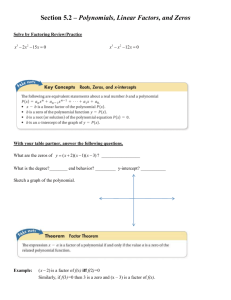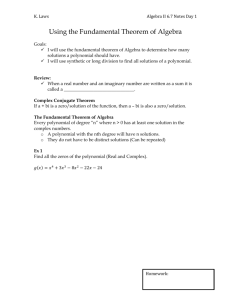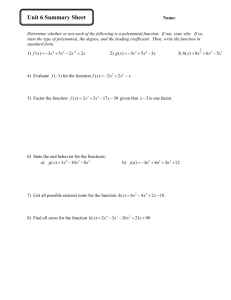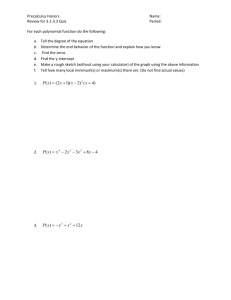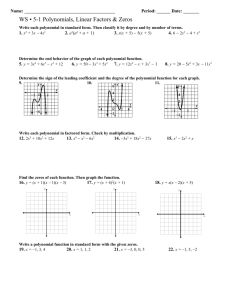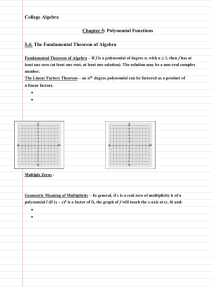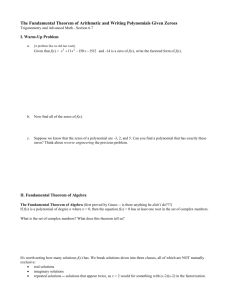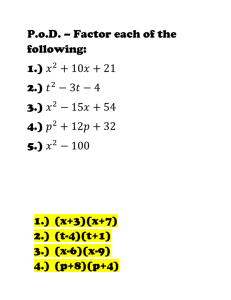66, 2 (2014), 148–154 June 2014 AN
advertisement
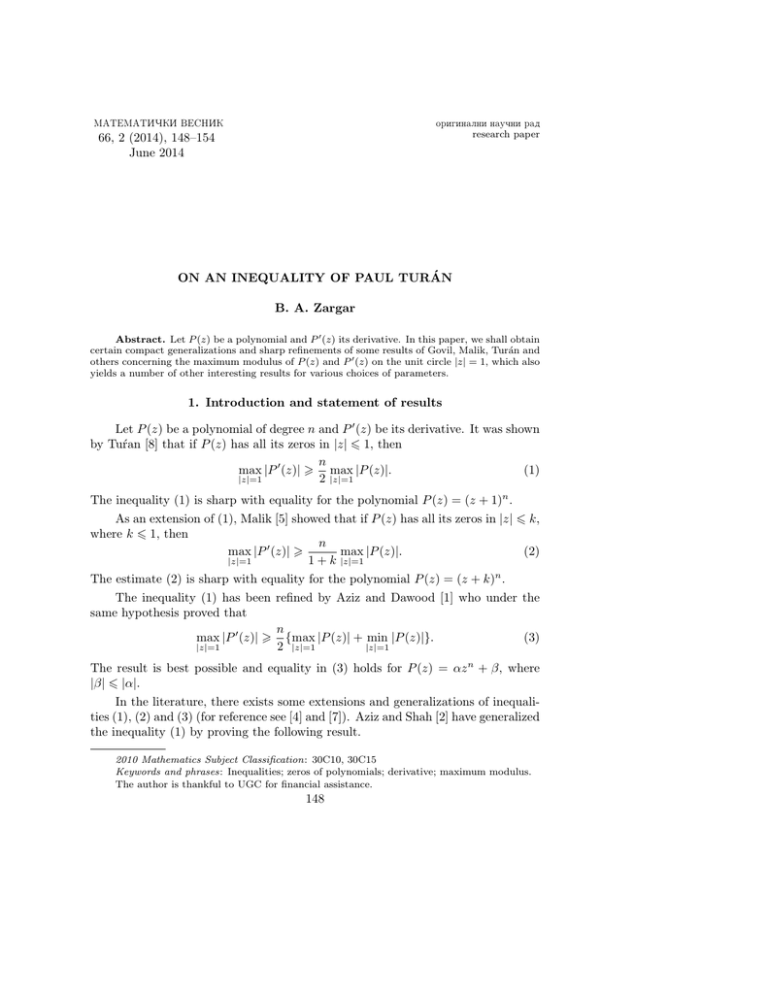
MATEMATIQKI VESNIK
originalni nauqni rad
research paper
66, 2 (2014), 148–154
June 2014
ON AN INEQUALITY OF PAUL TURÁN
B. A. Zargar
Abstract. Let P (z) be a polynomial and P 0 (z) its derivative. In this paper, we shall obtain
certain compact generalizations and sharp refinements of some results of Govil, Malik, Turán and
others concerning the maximum modulus of P (z) and P 0 (z) on the unit circle |z| = 1, which also
yields a number of other interesting results for various choices of parameters.
1. Introduction and statement of results
Let P (z) be a polynomial of degree n and P 0 (z) be its derivative. It was shown
by Tuŕan [8] that if P (z) has all its zeros in |z| 6 1, then
n
max |P 0 (z)| > max |P (z)|.
(1)
2 |z|=1
|z|=1
The inequality (1) is sharp with equality for the polynomial P (z) = (z + 1)n .
As an extension of (1), Malik [5] showed that if P (z) has all its zeros in |z| 6 k,
where k 6 1, then
n
max |P 0 (z)| >
max |P (z)|.
(2)
1 + k |z|=1
|z|=1
The estimate (2) is sharp with equality for the polynomial P (z) = (z + k)n .
The inequality (1) has been refined by Aziz and Dawood [1] who under the
same hypothesis proved that
n
max |P 0 (z)| > {max |P (z)| + min |P (z)|}.
(3)
2 |z|=1
|z|=1
|z|=1
The result is best possible and equality in (3) holds for P (z) = αz n + β, where
|β| 6 |α|.
In the literature, there exists some extensions and generalizations of inequalities (1), (2) and (3) (for reference see [4] and [7]). Aziz and Shah [2] have generalized
the inequality (1) by proving the following result.
2010 Mathematics Subject Classification: 30C10, 30C15
Keywords and phrases: Inequalities; zeros of polynomials; derivative; maximum modulus.
The author is thankful to UGC for financial assistance.
148
On an inequality of Paul Turán
149
Theorem A. If P (z) is a polynomial of degree n having all its zeros in the
disk |z| 6 k 6 1 with s-fold zero at the origin, 0 < s 6 n, then
max |P 0 (z)| >
|z|=1
n + ks
max |P (z)|.
1 + k |z|=1
The result is sharp and the extremal polynomial is P (z) = z s (z + k)n−s .
Recently, Aziz and Zargar [3] have obtained the following refinement of Theorem A.
Theorem B. If P (z) is a polynomial of degree n, having all its zeros in the
disk |z| 6 k, k 6 1 with t-fold zero at the origin, 0 < t 6 n, then
max |P 0 (z)| >
|z|=1
n−t
n + kt
max |P (z)| +
min |P (z)|.
1 + k |z|=1
(1 + k)k t |z|=k
(4)
The result is sharp and equality in (4) holds for the polynomial P (z) = z t (z +k)n−t .
In this paper, we shall first present the following generalization of Theorem B
(which is obtained as a special case for R = 1).
Theorem 1. If P (z) is a polynomial of degree n having all its zeros in the
disk |z| 6 k, k 6 1 with t-fold zero at the origin, 0 6 t 6 n, then for every R > k,
µ
¶
nR + kt
Rt−1 nR + kt
0
max |P (z)| >
max |P (z)| +
− t min |P (z)|.
R(R + k) |z|=R
kt
R+k
|z|=R
|z|=k
The result is best possible and equality holds for the polynomial P (z) = z t (z +k)n−t .
The following result follows by taking R = k in Theorem 1.
Corollary 1. If P (z) is a polynomial of degree n having all its zeros in the
disk |z| 6 k, 0 < k 6 1 with t-fold zero at the origin, 0 6 t 6 n, then
max |P 0 (z)| >
|z|=k
1
{(n + t) max |P (z)| + (n − t) min |P (z)|}.
2k
|z|=k
|z|=k
(5)
The result is best possible with equality for the polynomial P (z) = z t (z + k)n−t .
Note that the inequality (3) follows from (5) by taking k = 1 and t = 0.
We next present the following generalization of Theorem 1 which includes
Theorem B as a special case.
Theorem 2. If P (z) is a polynomial of degree n having all its zeros in the
disk |z| 6 k, 0 < k 6 1 with t-fold zero at the origin, 0 6 t 6 n, then for r 6 R,
rR > k 2 ,
µ
¶n−t
Rt−1 nR + kt R + k
max |P 0 (z)| >
max |P (z)|
rt R + k
r+k
|z|=R
|z|=r
µ
¶
Rt−1 nR + kt
−
t
min |P (z)|. (6)
+
kt
R+k
|z|=k
150
B.A. Zargar
The result is best possible and equality in (6) holds for the polynomial P (z) =
cz t (z + k)n−t , c 6= 0.
Finally, we present the following compact generalization of inequalities (4) and
(5), which is an improvement of Theorem 2 and yields a number of other interesting
results for various choices of parameters t, r and R.
Theorem 3. If P (z) is a polynomial of degree n having all its zeros in the
disk |z| 6 k, 0 < k 6 1 with t-fold zero at the origin, 0 6 t 6 n, then for r 6 R,
rR > k 2 ,
µ
¶n−t · t−1
R+k
R
nR + kt
0
max |P (z)| >
max |P (z)|
r+k
rt R + k |z|=r
|z|=R
¸
³ r + k ´n−t ´
Rt−1 ³ nR + kt
−t
min |P (z)| . (7)
+
kt
R+k
R+k
|z|=k
The result is best possible and equality in (7) holds for the polynomial P (z) =
cz t (z + k)n−t , c 6= 0.
Since n > t and R > r, we see that
nR + kt
>t>t
R+k
This implies
nR + kt
−t
R+k
µ
µ
r+k
R+k
r+k
R+k
¶n−t
.
¶n−t
> 0.
Using this fact in (7), the following result immediately follows from Theorem 3.
Corollary 2. If P (z) is a polynomial of degree n having all its zeros in the
disk |z| 6 k, 0 < k 6 1 with t-fold zero at the origin, 0 6 t 6 n, then for r 6 R,
rR > k 2 ,
µ
¶n−t · t−1
¸
R+k
R
nR + kt
0
max |P (z)| >
max |P (z)| .
(8)
r+k
rt R + k |z|=r
|z|=R
The result is sharp and equality in (8) holds for the polynomial P (z) = z t (z +k)n−t .
If we take t = 0 in Theorem 3, we obtain
Corollary 3. If P (z) is a polynomial of degree n having all its zeros in the
disk |z| 6 k, 0 < k 6 1, then for r 6 R, Rr > k 2 ,
µ
¶n ·
¸
n
n
R+k
0
max |P (z)| +
min |P (z)| .
max |P (z)| >
r+k
R + k |z|=r
R + k |z|=k
|z|=R
The following result follows by taking r = 1 in Theorem 3.
On an inequality of Paul Turán
151
Corollary 4. If P (z) is a polynomial of degree n having all its zeros in the
disk |z| 6 k, 0 < k 6 1 with t-fold zero at the origin, 0 6 t 6 n, then for k 6 R,
µ
¶n−t ·
R+k
nR + kt
max |P 0 (z)| >
Rt−1
max |P (z)|
1+k
R + k |z|=1
|z|=R
¸
³ 1 + k ´n−t ´
Rt−1 ³ nR + kt
+
−t
min |P (z)| .
kt
R+k
R+k
|z|=k
For the proofs of Theorems 2 and 3, we need the following lemma, which may
be of independent interest.
Lemma. If P (z) is a polynomial of degree n, having all its zeros in |z| 6 k,
k > 0 with t-fold zero at the origin, then for |z| = 1, rR > k 2 and r 6 R,
µ
¶n−t
rt r + k
|P (Rz)|.
(9)
|P (rz)| 6 t
R
R+k
Equality in (9) holds for the polynomial P (z) = z t (z + k)n−t .
Proof. Since P (z) has all of its zeros in |z| 6 k and t-fold zero at the origin,
we can write
P (z) = z t H(z),
(10)
where H(z) is a polynomial of degree n − t having all of its zeros in |z| 6 k, so that
H(z) = c
n−t
Y
(z − Rj eiθj ),
j=1
where Rj 6 k, j = 1, 2, . . . , n − t. This implies that for each θ, 0 6 θ < 2π,
¯
¯
¯
Y ¯¯ rei(θ−θj ) − Rj ¯
¯ H(reiθ ) ¯ n−t
¯
¯
¯=
¯
¯ H(Reiθ ) ¯
¯ Rei(θ−θj ) − R ¯ .
j
j=1
(11)
Now for R > r, Rr > Rj2 and for each θ, 0 6 θ < 2π, it can be easily verified that
¯2 µ
¯ i(θ−θ )
¶2
j
¯ re
r + Rj
− Rj ¯¯
¯
6
.
¯ Rei(θ−θj ) − R ¯
R + Rj
j
Since Rj 6 k for all j = 1, 2, . . . , n − t, it follows from (11) that if r 6 R and
rR > k 2 , then
¯
¯ µ
¶n−t
¯ H(reiθ ) ¯
¯
¯6 r+k
.
¯ H(Reiθ ) ¯
R+k
Using (10), it follows that
¯
¯
¯
¯
µ
¶n−t
t ¯
iθ ¯
t
¯ P (reiθ ) ¯
r+k
¯ = r ¯ H(re ) ¯ 6 r
¯
.
¯ P (Reiθ ) ¯ Rt ¯ H(Reiθ ) ¯ Rt R + k
Hence, for R > r, Rr > k 2 and for each θ, 0 6 θ < 2π, we have
µ
¶n−t
rt r + k
|P (reiθ )| 6 t
|P (Reiθ )|
R
R+k
wherefrom the desired result follows immediately.
152
B.A. Zargar
2. Proofs of the theorems
Proof of Theorem 1. Let m = min|z|=k |P (z)|. Then m 6 |P (z)| for |z| = k
gives m| kz |t 6 |P (z)| for |z| = k. Since all the zeros of P (z) lie in |z| 6 k 6 1
with t-fold zero at the origin, it follows (by Rouché’s Theorem for m > 0) that for
t
every complex number α such that |α| < 1, the polynomial G(z) = P (z) + αm
kt z
has all of its zeros in |z| 6 k with t-fold zero at the origin. Hence, the polynomial
k
F (z) = G(Rz) has all of its zeros in |z| 6 R
6 1, with t-fold zero at the origin, so
that we can write
F (z) = z t H(z),
(12)
k
6 1.
where H(z) is a polynomial of degree n − t, having all of its zeros in |z| 6 R
From (12), we have
zF 0 (z)
zH 0 (z)
=t+
.
(13)
F (z)
H(z)
k
If z1 , z2 , . . . , zn−t are the zeros of H(z), then |zj | 6 R
6 1 for all j = 1, 2, . . . , n−t,
and from (13), we obtain
½ iθ 0 iθ ¾
½ iθ 0 iθ ¾
µ
¶
n−t
X
e F (e )
e H (e )
1
Re
=
t
+
Re
=
t
+
(14)
Re
F (eiθ )
H(eiθ )
1 − zj e−iθ
j=1
for points eiθ , 0 6 θ < 2π which are not zeros of H(z).
µ
¶
1
1
k
Now, if |w| 6 R
6 1, then it can be easily verified that Re
>
1−w
1+
Using this fact in (14), we see that
¯ 0 iθ ¯
¾
½
0 iθ
¯ F (e ) ¯
tk + nR
n−t
iθ F (e )
¯
¯
¯ F (eiθ ) ¯ > Re e F (eiθ ) > t + 1 + k = R + k
R
k
R
.
for points eiθ , 0 6 θ < 2π which are not zeros of H(z). This implies that
tk + nR
|F 0 (eiθ )| >
|F (eiθ )|
(15)
R+k
for points eiθ , 0 6 θ < 2π, other than zeros of F (z). Since (15) is trivially true for
points eiθ which are the zeros of F (z), it follows that
tk + nR
|F 0 (z)| >
|F (z)| for |z| = 1.
(16)
R+k
Replacing F (z) by G(Rz) in (16), we get
tk + nR
|G(Rz)| for |z| = 1.
(17)
|G0 (Rz)| >
R(R + k)
t
Using that G(z) = P (z) + αm
kt z , it follows that
¯
¯
¯
¯
t−1
¯ 0
¯
tk + nR ¯¯
αmRt t ¯¯
t−1 ¯
¯P (Rz) + αmtR
z ¯>
z¯
P (Rz) +
(18)
¯
kt
R(R + k) ¯
kt
for |z| = 1 and for every α, |α| < 1. Choosing the argument on the RHS of (18)
such that
¯
¯
t
t ¯
¯
¯P (Rz) + αmR z t ¯ = |P (Rz)| + |α|mR for |z| = 1,
¯
¯
t
t
k
k
153
On an inequality of Paul Turán
from (18), we obtain
|P 0 (Rz)| +
mtRt−1
tk + nR
|α| >
kt
R(R + k)
½
|P (Rz)| +
|α|mRt
kt
¾
for |z| = 1 and |α| < 1. Letting |α| → 1, we conclude that
¾
½
tk + nR
Rt−1 tk + nR
0
|P (Rz)| >
|P (Rz)| +
−t m
R(R + k)
kt
R+k
for |z| = 1, which gives
max |P 0 (z)| >
|z|=R
tk + nR
Rt−1
max |P (z)| +
R(R + k) |z|=R
kt
½
tk + nR
−t
R+k
(19)
¾
min |P (z)|.
|z|=k
This completes the proof of Theorem 1.
Proof of Theorem 2. Proceeding similarly as in the proof of Theorem 1, it
follows from (19) that
½
¾
tk + nR
Rt−1 tk + nR
0
|P (Rz)| >
|P (Rz)| +
−t m
R(R + k)
kt
R+k
for |z| = 1. Applying the above Lemma, it follows that
µ
¶n−t
½
¾
tk + nR Rt R + k
Rt−1 tk + nR
0
|P (Rz)| >
|P (rz)| +
−t m
R(R + k) k t r + k
kt
R+k
for |z| = 1. This implies that
max |P 0 (z)| >
|z|=R
Rt−1 tk + nR
rt R + k
µ
R+k
r+k
¶n−t
max |P (z)|
µ
¶
Rt−1 tk + nR
+
−
t
min |P (z)|,
kt
R+k
|z|=k
|z|=r
which completes the proof of Theorem 2.
Proof of Theorem 3. We proceed similarly as in the proof of Theorem 1. It
follows from (17) that
tk + nR
|G0 (Rz)| >
|G(Rz)| for |z| = 1.
R(R + k)
Now, applying the above Lemma to G(z), we get
µ
¶n−t
tk + nR Rt R + k
0
|G (Rz)| >
|G(rz)|
R(R + k) rt r + k
for |z| = 1,
(20)
t
where r 6 R and rR > k 2 . Since G(z) = P (z) + αm
kt z , it follows from (20) that
¯
¯
¯
µ
¶
n−t ¯
t−1
¯ 0
¯
¯
¯
tk + nR Rt R + k
αmt
t−1 ¯
t¯
¯P (Rz) + αmtR
¯
z ¯>
P (rz) + t (rz) ¯ (21)
¯
¯
t
t
k
R(R + k) r
r+k
k
for |z| = 1 and for every α with |α| < 1. Choosing the argument of α such that
¯
¯
¯
¯
¯P (rz) + αmt (rz)t ¯ = |P (rz)| + |α| m rt for |z| = 1,
¯
¯
t
k
kt
154
B.A. Zargar
it follows from (21) that
µ
¶n−t t
tK + nR R + k
R
|P 0 (Rz)| >
|P (rz)|
R(R + k) r + k
rt
·
µ
¶n−t
¸
|α| t−1 tk + nR R + k
+ tR
−t m
k
R+k
r+k
for |z| = 1. Letting |α| → 1, we get
µ
¶n−t t
tk + nR R + k
R
|P 0 (Rz)| >
|P (rz)|
R(R + k) r + k
rt
µ
¶n−t ·
µ
¶n−t ¸
tk + nR
r+k
Rt−1 R + k
−
t
m
+
kt
r+k
R+k
R+k
for |z| = 1. This implies that
µ
¶n−t ½ t−1
R+k
R (tk + nR)
0
max |P (z)| >
max |P (z)|
r+k
rt (R + k) |z|=r
|z|=R
·
¾
³ r + k ´n−t ¸
Rt−1 tk + nR
+
−t
min |P (z)| ,
kt
R+k
R+k
|z|=k
which proves the desired result.
REFERENCES
[1] A. Aziz, Q. M. Dawood, Inequalities for a polynomial and its derivatives, J. Approx. Theory
54 (1988), 306–313.
[2] A. Aziz, W. M. Shah, Inequalities for a polynomial and its derivative, Math. Ineq. Appl. 7
(2004), 379–391.
[3] A. Aziz, B. A. Zargar, Inequalities for the maximum modulus of the derivative of a polynomial,
J. Ineq. Pure Appl. Math. 8 (2007).
[4] K. K. Dewan, Inequalities for a polynomial and its derivative II, Math. Anal. Appl. 190
(1995), 625–629.
[5] M. A. Malik, On the derivative of a polynomial, J. London Math. Soc. 1 (1969), 57–60.
[6] G. V. Milovanović, D. S. Mitrinović, Th. M. Rassias, Topics in Polynomials, Extremal Properties, Inequalities and Zeros, World Sci. Publ. Co., Singapore, 1994.
[7] Q. I. Rahman, G. Schmeisser, Analytic Theory of Polynomials, Clarendon Press, Oxford, 2002.
[8] P. Turán, Über die Ableitung von Polynomen, Compositio Math. 7 (1939), 89–95.
(received 23.07.2012; in revised form 15.03.2013; available online 10.09.2013)
P.G. Department of Mathematics, University of Kashmir, Srinagar
E-mail: bazargar@gmail.com
